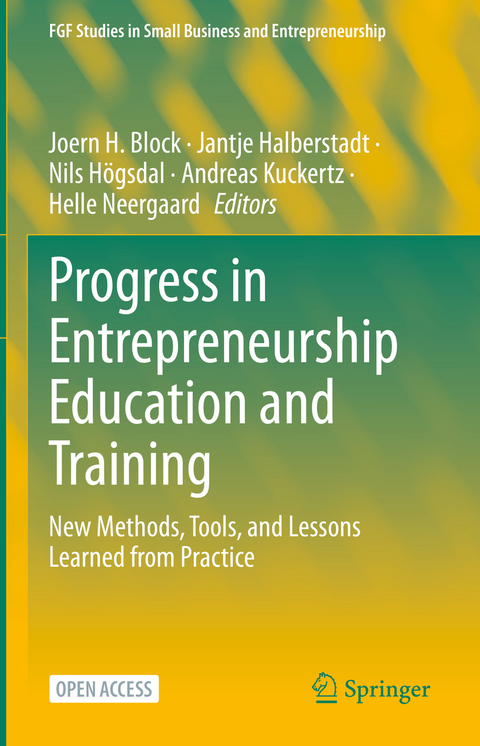
Progress in Entrepreneurship Education and Training
Springer International Publishing (Verlag)
978-3-031-28558-5 (ISBN)
The education of future entrepreneurs shapes how we will live in the future, and proper entrepreneurship education is thus of utmost importance. Entrepreneurship educators and researchers constantly renew tools, interventions, and training programs for entrepreneurship education and adapt them to the specific needs of entrepreneurs and developments in the entrepreneurship ecosystem. This open-access book is based on this background and offers expert insights that highlight context-specificity and discuss training methods and tools that are impact-oriented. The authors represent multiple institutional and cultural backgrounds, to provide a useful resource with new ideas for the community of entrepreneurship educators, facilitators, and scholars. Based on the chapters, the editors of the volume also offer several propositions and critical insights important for the current state of entrepreneurship education and its future development. This book will be a valuable resource for entrepreneurship educators and education policymakers alike.
Univ.-Prof. Dr. Joern Block is a professor of management at the University of Trier (Germany). His research focuses on entrepreneurship, sustainability, and innovation management in small and large firms. He is currently head of the entrepreneurship and innovation management division of the Verband der Hochschullehrerinnen und Hochschullehrer für Betriebswirtschaft (VHB). Univ.-Prof. Dr. Jantje Halberstadt is a professor of Economics and Sustainability at the University of Vechta (Germany), where she is also Dean of Studies at the Faculty of Education and Social Sciences. Her main research interests are in the area of entrepreneurship and management, particularly transformational sustainability entrepreneurship related to various fields, such as ICT, agriculture and food, sports, education, and gender studies. Prof. Dr. Nils Högsdal is teaching Corporate Finance and Entrepreneurship at Hochschule der Medien Stuttgart (Stuttgart Media University, Germany). He is active in both the scientific discipline of entrepreneurship as well as the real startup community. He is an active entrepreneurship researcher and educator, inviting the community every year to the International Entrepreneurship Education Summit. In 2015 In 2015 Nils was awarded one of the statewide teaching awards by Baden-Württemberg. He also serves the university as "Prorektor Innovation" which best translates as the vice president for innovation. Dr. Helle Neergaard is a professor of entrepreneurship at the Department of Management, Aarhus University (Denmark). She is currently Editor-in-Chief of the International Journal of Gender and Entrepreneurship. She is the former president of ECSB and the 2018 European Entrepreneurship Educator Laureate. Her main research interests are gender and entrepreneurship. Univ.-Prof. Dr. Andreas Kuckertz is head of the Entrepreneurship Research Group at the University of Hohenheim (Germany). For FGF e.V., the largest academic association in German-speaking countries focusing on entrepreneurship, innovation, and SMEs, he has been serving as president since October 2018.
Chapter 1 The Future of Entrepreneurship Education and Training: Some Propositions.- Part I: Effects and impact of entrepreneurship education.- Chapter 2 Shaping Great Transformations in Germany - the Role of Youth Entrepreneurship Education (YEE).- Chapter 3 Shaping Great Transformations in Germany - the Role of Youth Entrepreneurship Education (YEE) Gender Team Diversity in Entrepreneurship Education.- Chapter 4 The "Start-up" Answer: Examining a hidden dramaturgy in entrepreneurial learning beyond the four walls of the classroom.- Chapter 5 Entrepreneurship Education and Political Change: An Exploratory Study.- Chapter 6 Re-evaluating Entrepreneurship Education through a Team-based Approach: Activities and Archetypes within a Scottish University.- Chapter 7 Coaching concept to improve the sustainability impact of students' startup ideas in an early stage.- Chapter 8 competencies in student companies at school: Development of a research instrument.- Chapter 9 Moving the Needle in Entrepreneurship Education and bridging the gaps.- Part II: Context and target groups of entrepreneurship education.- Chapter 10 Entrepreneurial Design Thinking ©in Higher Education: Conceptualizing Cross-Cultural Adaptation of The Western Teaching Methodology to the Eastern Perspective.- Chapter 11 Progressing Context in Entrepreneurship Education-Reflections from a Delphi Study.- Chapter 12 The incorporated approach: From project based learning in entrepreneurship education to project based learning as entrepreneurship education in German schools.- Chapter 13 Best practice considerations for arts educators when developing intensive online courses for creative industries higher education students.- Chapter 14 What can SMEs learn from universities? - Transferring entrepreneurship education knowledge from the university to the corporate world.- Chapter 15 Female entrepreneurs' motivations, intentions and barriers in Higher Education: a case study from Team Academy Bristol.- Chapter 16 TheExperiential Perceptions of Entrepreneurial Competencies: Avenues for The Next Generation Entrepreneurship Education.- Part III: Design, didactical approaches, and pedagogy of entrepreneurship education.- Chapter 17 Design Thinking within Entrepreneurship Education - Different Perspectives and Common Themes in the Literature.- Chapter 18 Entrepreneurship Education in Digital Environments: Developing a Didactic Framework for a New Era.- Chapter 19 Sport as a Vehicle for Entrepreneurship Education: Approaches and Future Directions.- Chapter 20 The role of (self-) reflection in an increasingly digital entrepreneurship education environment.- Chapter 21 Transformative action and the structure of reflexivity: Aspects of enterprise teaching and quality pedagogy.- Chapter 22 The IMPACT Circle - A new design-based method for developing business opportunities with sustainable impact.- Chapter 23 Threshold Concepts in Entrepreneurship Education and their Implications for Teaching and Learning.-Chapter 24 Using Technology to Teach International Entrepreneurship: State-of-the-Art Practices and Opportunities.- Chapter 25 A Student-Run Business as a Construct for Entrepreneurship Education - Presenting the Exploratory Case Study 'Culinary Coffee'.- Chapter 26 Educating entrepreneurship through design.- Chapter 27 Future Proof: Hackathons as Occasions to Experience Entrepreneurial Thinking.- Chapter 28 Design Sprints - A New Tool for Social Entrepreneurship Education.- Chapter 29 Creativity in Entrepreneurship Education: Insights from Online Ideation Courses.- Chapter 30 Belonging in entrepreneurship: The cascading benefits of the Accelerator Rap approach.- Chapter 31 "If you want to work fast, go alone. If you want to go far, go together - A case for shifting entrepreneurship education towards team-based trainings".
| Erscheinungsdatum | 14.05.2023 |
|---|---|
| Reihe/Serie | FGF Studies in Small Business and Entrepreneurship |
| Zusatzinfo | VIII, 488 p. 44 illus., 35 illus. in color. |
| Verlagsort | Cham |
| Sprache | englisch |
| Maße | 155 x 235 mm |
| Gewicht | 899 g |
| Themenwelt | Sozialwissenschaften ► Pädagogik ► Berufspädagogik |
| Wirtschaft ► Betriebswirtschaft / Management ► Personalwesen | |
| Wirtschaft ► Betriebswirtschaft / Management ► Unternehmensführung / Management | |
| Schlagworte | Education • Entrepreneurship • open access • Training • vocational education |
| ISBN-10 | 3-031-28558-1 / 3031285581 |
| ISBN-13 | 978-3-031-28558-5 / 9783031285585 |
| Zustand | Neuware |
| Informationen gemäß Produktsicherheitsverordnung (GPSR) | |
| Haben Sie eine Frage zum Produkt? |
aus dem Bereich


